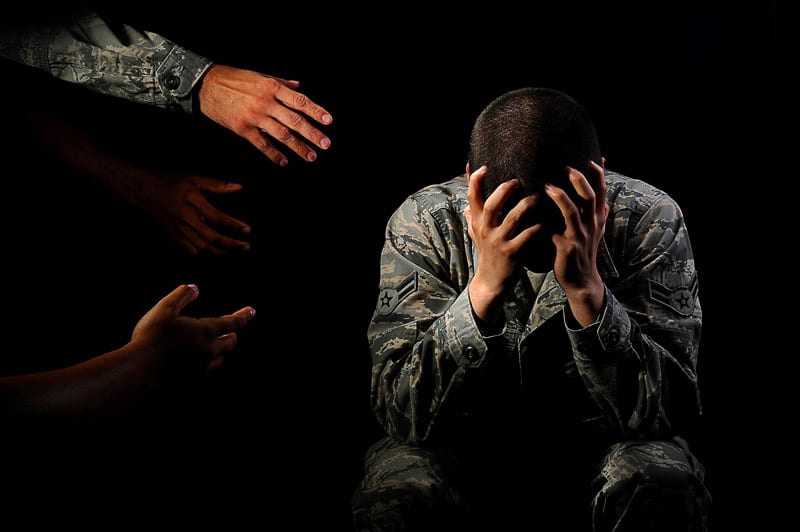Depression and anxiety were once silent torments that people dealt with in isolation. But society has evolved to a stage where we’re encouraged to tackle these problems openly in the way that works best for us.
Anyone can suffer from these mental health issues, with the U.S. Department of Veterans Affairs reporting that 11% of military personnel do at some point in their lives. This means that you or a veteran you know may have to deal with depression or anxiety.
We’ve highlighted four ways you can tackle these two things. See which one you think works best for you, and try it in your own time and at your own pace.
Talk to your family
Your family is anyone that you hold dear.
They’re friends, relatives, partners, or children – any of your loved ones. If you’re experiencing depression or anxiety as a veteran, it’s a good idea to talk to someone you consider to be family.
Depression and anxiety can be very lonely things to deal with. Talking to a family member helps because it means you’re no longer alone. And the people you love want to help you because they care about you.
You should talk to your family in the way that works best for you, from an email to one person all the way up to a face-to-face conversation with multiple people.
The important thing is that you let them know how you feel.
Start an exercise regime
Exercise is anything that gives you a workout.
As a military person, you’ll be used to exercising regularly, and dropping your routine can cause mental health issues. By starting a new regime, you can regain some focus.
Exercise is proven to help with anxiety and depression. Doctors often recommend it during consultations, and the U.S. National Library of Medicine has published a paper looking at its impact on depression and anxiety.
The key to using exercise to deal with depression and anxiety is to do something you enjoy. This means that you don’t have to focus on any one thing or do it alone.
Indeed, if you choose a team sport for exercise, this could help you build new relationships and connections.
Chat with fellow veterans
Veterans include anyone who has served in the military.
They might be people of your unit that you toured with or complete strangers who hold different positions. Whatever their status, chatting with fellow veterans helps with depression and anxiety because they might have experienced the same issues you have.
Veterans are uniquely placed to understand what you’re going through. Specialists and family can offer you genuine and helpful support. However, it’s likely they don’t know the particular stresses that confront someone who was in the military.
Chatting to someone who served with you can be a good way of connecting with a veteran. If you’d prefer to speak to a stranger, then you may want to talk to someone from a dedicated veteran’s organization, such as Vet Comp & Pen. A veteran’s organization that listens to and solves problems for people who’ve served prioritizes getting you the medical support you’re entitled to, including help dealing with anxiety and depression.
Whether you speak to someone you know or someone who knows what it’s like to serve their country, the important thing is that it can really help to talk to someone who understands what you’re going through. Because sometimes it’s not just about talking to a person who understands depression and anxiety. Sometimes you need to talk to someone who gets the depression and anxiety that you are feeling.
Take up gardening
Gardening isn’t just planting a few flowers on your lawn. It can be working on your own land, a community allotment, or someone else’s garden. Whatever approach you take, the benefit of this activity is that it provides a way of tackling anxiety and depression.
Gardening helps veterans to deal with mental health problems because it acts as a form of green therapy. It gives you access to fresh air and sunlight, both of which can act as remedies for depression and anxiety. It can also give you a chance to connect with people.
Numerous studies have looked at gardening’s ability to improve mental health, and many benefits have been found. Happiful pinpoints five ways gardening can help, from exposure to sunshine lifting your mood to the communal nature of the activity, giving you a chance to connect with people.
The way you garden will depend on your circumstances. If you have the land you can do it at home. If you don’t, a community garden may be your best option.
The important thing is that gardening can really help you deal with depression and anxiety, so take the time to find a way of doing it that works for you.
Talking to your family, exercise, chatting with fellow veterans, and gardening are all ways of helping you deal with depression and anxiety.
While each one offers genuine assistance, they are all different, which means it’s impossible to say which option will work best for you.
Try the tactic that you think will have the greatest benefit and take it from there.
If you or someone you know experiences mental health issues, it is important to seek help from a qualified professional. Our Resource Specialist can help you find expert mental health resources to recover in your community. Contact us now for more information on this free service to our users.
About the Author: Stevie Nicks is Digital Editor at Just Another Magazine – a website that covers the topics you care about. You’ll find articles about lifestyle, travel, fashion, trends, and relationships on our site – each of which is written in our unique style.
Image Credit: Wikimedia
The opinions and views expressed in any guest blog post do not necessarily reflect those of www.rtor.org or its sponsor, Laurel House, Inc. The author and www.rtor.org have no affiliations with any products or services mentioned in the article or linked to therein. Guest Authors may have affiliations to products mentioned or linked to in their author bios only.
Recommended for You
- The Intersection of LGBTQ+ Identity and Mental Health - December 9, 2024
- What Are the Signs of Self-Harm? A Comprehensive Guide - December 5, 2024
- People-Pleasing: Definition, Examples, and What You Can Do Instead - December 2, 2024





